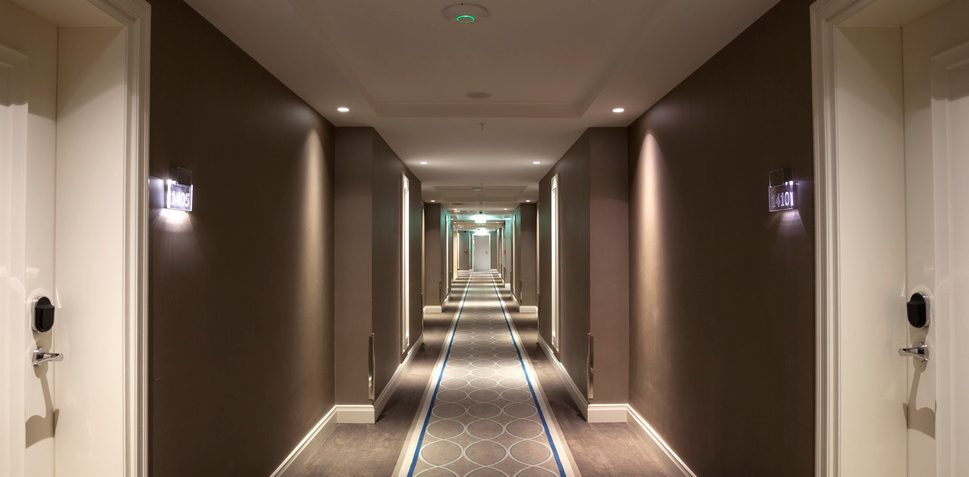©2026 Pacific Gas and Electric Company
5 ways hotels can save energy by leaving the light off

The 47,000 hotels and motels in the United States spend about 6% of their operating costs on energy each year, but it doesn’t have to be that way. 1 Hotel and motel establishments looking to save energy need look no further than their own lighting systems to impact the bottom line. Smart lighting practices and retrofits can reduce lighting electricity use by 50% or more (depending on the starting point) and cut cooling energy requirements by 10 to 20%.1 Incorporate the following five money-saving ideas into your hotel or motel to save energy and reduce costs.
LED Efficient Bulbs and Lighting Systems. Upgrade to light-emitting diode (LED) bulbs that are more energy efficient than incandescent and florescent alternatives. LED bulbs last 35 to 50 times longer than incandescent bulbs and two to five times longer than fluorescent lighting, translating into dramatic savings in hotel and motel upkeep.2 With LED upgrades, you see savings in your monthly energy bills in addition to your maintenance personnel costs. Troffers – the rectangular light fixtures that you usually see fit into dropped ceiling grids in kitchens and backrooms – can also be upgraded to energy efficient LED systems. If you’re on a tight budget, money-saving retrofit kits can be inserted into existing troffers, so you upgrade only the guts of the system. Retrofit kits replace existing fluorescent lamps, sockets, ballasts, lenses and frames, and can be purchased and replaced per fixture. These are best for hotel managers who want to upgrade in stages rather than in one pass.
Timers. Hotel and motel occupants have so much on their minds. Travelling with children, making the conference session or navigating an unfamiliar city are all stressors that contribute to forgetting to turn the lights off after they leave. Timers take the responsibility of conserving hotel and motel energy, so your busy guests don’t have to. Controls on bathroom lamps are an especially logical choice and a great opportunity for energy savings because of their high-power use. Timers in stock rooms are helpful too, since employees often leave with full hands and may have difficulty flipping the light switch off on their way out.
Occupancy Sensors. Like timers, occupancy sensors don’t rely on people to remember to turn the lights off before they leave. These energy efficient sensors turn lights off when areas are unoccupied and turn lights back on when movement is detected. Occupancy sensors are ideal in large restrooms, hallways, meeting rooms and back rooms. Use sensors in conjunction with scheduled lighting and dimming at night to take pathways from dim to well-lit to make your guests feel comfortable and secure.
Daylight. It’s not just for the outdoors. The more you rely on natural energy to provide light, the less you’ll spend on lighting costs. That’s why incorporating natural light into your hotel or motel is key to reducing energy use. Upgrades should always consider ways to bring more daylight into places of occupancy. Not only does it help cut costs, but it’s also aesthetically pleasing to patrons. To avoid elevated cooling costs in summer, simply draw the blinds or curtains in guest rooms and public areas with large windows.
Get Everyone Involved. Make energy conservation a responsibility of all hotel staff and incorporate energy-saving practices into daily routines to make a big difference in energy consumption. Instruct housekeeping to use natural lighting for morning room cleanings, turn off lights and hotel appliances that have been left on by patrons and close the shades when exiting guest rooms. When all hotel and motel staff are working toward the same energy goals, you’ll be surprised how much can be accomplished. Additionally, you can bring staff into the equation by taking suggestions on to implement standards to conserve energy in their various roles.
Hotels and motels offer an incredible opportunity for energy cost-savings if you take it a step at a time. To learn more about how hotels and motels save energy, take a look at PGE’s eBook, “20 Sustainable Products”, available for free online download.
Sources:
- Department of Energy
- Department of Energy
